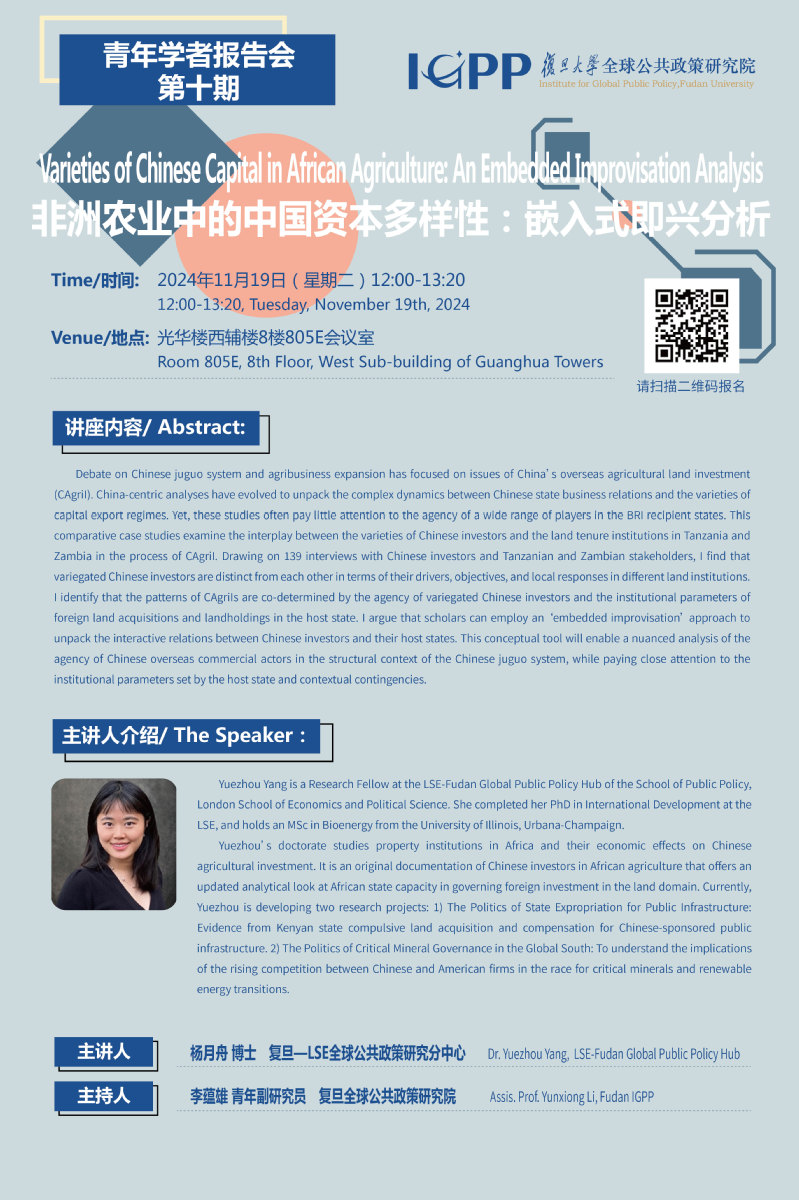
Young Scholar Workshop No.10
Title:
Varieties of Chinese Capital in African Agriculture: An Embedded Improvisation Analysis
Speaker:
Dr. Yuezhou Yang, LSE-Fudan Global Public Policy Hub
Host:
Assis. Prof. Yunxiong Li, Fudan IGPP
Time:
12:00-13:20, Tuesday, November 19th, 2024
Venue:
Room 805E, 8th Floor, West Sub-building of Guanghua Towers
https://www.wjx.cn/vm/OtI8gCY.aspx

The Speaker:

Yuezhou Yang is a Research Fellow at the LSE-Fudan Global Public Policy Hub of the School of Public Policy, London School of Economics and Political Science. She completed her PhD in International Development at the LSE, and holds an MSc in Bioenergy from the University of Illinois, Urbana-Champaign.
Yuezhou’s doctorate studies property institutions in Africa and their economic effects on Chinese agricultural investment. It is an original documentation of Chinese investors in African agriculture that offers an updated analytical look at African state capacity in governing foreign investment in the land domain. Currently, Yuezhou is developing two research projects: 1) The Politics of State Expropriation for Public Infrastructure: Evidence from Kenyan state compulsive land acquisition and compensation for Chinese-sponsored public infrastructure. 2) The Politics of Critical Mineral Governance in the Global South: To understand the implications of the rising competition between Chinese and American firms in the race for critical minerals and renewable energy transitions.
Debate on Chinese juguo system and agribusiness expansion has focused on issues of China’s overseas agricultural land investment (CAgriI). China-centric analyses have evolved to unpack the complex dynamics between Chinese state business relations and the varieties of capital export regimes. Yet, these studies often pay little attention to the agency of a wide range of players in the BRI recipient states. This comparative case studies examine the interplay between the varieties of Chinese investors and the land tenure institutions in Tanzania and Zambia in the process of CAgriI. Drawing on 139 interviews with Chinese investors and Tanzanian and Zambian stakeholders, I find that variegated Chinese investors are distinct from each other in terms of their drivers, objectives, and local responses in different land institutions. I identify that the patterns of CAgriIs are co-determined by the agency of variegated Chinese investors and the institutional parameters of foreign land acquisitions and landholdings in the host state. I argue that scholars can employ an ‘embedded improvisation’ approach to unpack the interactive relations between Chinese investors and their host states. This conceptual tool will enable a nuanced analysis of the agency of Chinese overseas commercial actors in the structural context of the Chinese juguo system, while paying close attention to the institutional parameters set by the host state and contextual contingencies.





